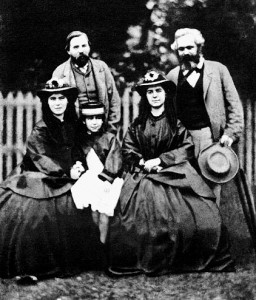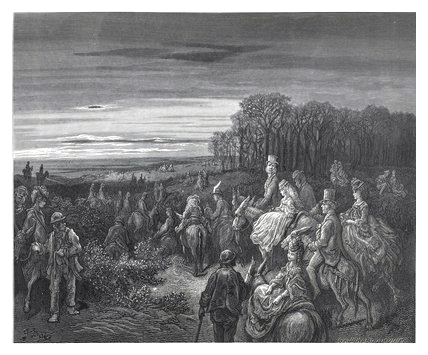Though unfamiliar now, Hampstead Heath was once famous for its donkeys. It was a comic sight, and Gustave Doré illustrated it for London: A Pilgrimage because it was ludicrous to see fashionable picnickers straddling the donkeys. It was fun for Karl Marx, who amused himself with the “primitive art of riding” amidst “mad laughing and whopping!” according to Wilhelm Liebknecht, his political associate and personal friend.
Liebknecht says he often joined the family on their Sunday excursions as they walked from the family’s house in Kentish Town. He remembers that Jenny Marx packed their picnic basket with roast veal and tea, which they supplemented with purchases from vendors on the Heath. My favorites were shrimp, watercress, periwinkles, bread, butter, and cheese. For drinks, they bought hot water and milk for the tea and an abundant supply of beer.

This Daguerreotype dated 1864 purports to have been taken at Hampstead Heath. Karl Karl Marx and Fredrich Engels stand behind Jenny Marx, their wife, daughters Laura (age 19) and Eleanor (age 10). The photographer is unknown.
Liebknecht does not mention it, but the Marx family might have walked singing Watkyn Williams’ popular song:
Oh! Hampstead is the place to ruralize, ruralise,
Extramuralize, Hampstead is the place to ruralise
On a summer’s day.
*Ruralizing was a euphemism for picnicking that has not survived
Featured Image: Gustave Doré. Hampstead Heath (1872). In Gustave Dore and Blanchard Jerrold. London: A Pilgrimage. London: Grant & Co., 1872.
See Wilhelm Liebknecht. Biographical Memoirs (1896). Translated by E. Untermann. Chicago: C. H. Kerr, 1906; Gustave Doré and Blanchard Jerrold. London: A Pilgrimage. London: Grant & Co., 1872; Watkyn Williams. Hampstead Is the Place to Ruralise, All on a Summer Day (1861),

